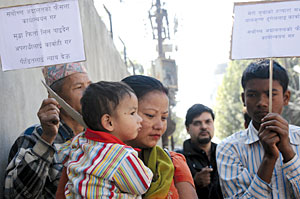 |
Us Nepalis are known for our weak institutional memory. Out of sight means out of mind. Agni Sapkota, Prabhu Sah and Bal Krishna Dhungel are not in the headlines, so they have fizzled out.
Just a month ago, it seemed everyone in this country, except understandably the Maoists, wanted a Truth and Reconciliation Commission (TRC).People wanted the whereabouts of the disappeared to be made public and the murderers of people like Ujjan Kumar Shrestha to be punished. Today, nobody except the relatives of the victims want the commission. The TRC was, like everything else, just political ping pong.
Prime Minister Baburam Bhattarai recently declared that the bills for truth and reconciliation and the disappeared are almost complete and both the commissions will be formed "before long". But then he went right ahead and refused an extension for the UN's Office of the High Commissioner for Human Rights (OHCHR). Any hope of having an effective TRC, even five years too late, has been dashed.
It is clear that by driving away the UN's human rights body, the Maoists want to deliberately weaken future commissions to deal with war crimes and ensure that they support its agenda of blanket amnesty.� Parties with militant wings, the army, police and the leaders of previous governments are only too happy to let the Maoists take the lead because they also have blood on their hands. It seems, justice which has been delayed for five years will now be denied forever.
All this directly enforces the state of impunity in the country. One after another, the government has rubbished orders issued by the Supreme Court. The prime minister is not just protecting convicted criminals, but openly saying individual investigations will� derail the peace process. Will it? It is more likely that reconciliation will be harder and justice will be a mirage if human rights abuses during the war are not addressed.
The architects of the war and those who ordered brutal crackdowns want South Africa to be a model and announce a mass amnesty. Every country is unique, and there are 20 other countries that have successfully completed or are working on truth and reconciliation processes. In some cases, culprits were convicted while some families agreed to forgive perpetrators and some cases were settled with reparations. But invariably, all cases were investigated and aired in public. The guilty had to admit to their crimes and the wrongfulness of their actions was established before they were considered for forgiveness.
� What the Maoists want here, however, is validation for their violence , especially the heinous crimes committed during the war. This is not reconciliation but betrayal.
There will be no lasting peace without justice for the victims of war. Post-conflict societies have used truth and reconciliation as a way to grieve, heal and move on. We, on the other hand, don't even want to hear the victims out. War mongers on both sides are so afraid of the truth and the violence they committed on the people, they are blackmailing the nation by saying that justice threatens peace.
Ideally, we should have been able to solve our own issues. We can't let foreigners manage our peace process forever. It's not particularly a proud moment when a foreign ambassador writes in the national media pressuring the government regarding human rights. This is what happens when, instead of protecting its own citizens, the state seeks to pardon itself for crimes committed against them.
The Maoists are getting the rap because they have the most to hide, but there are known war criminals in the security apparatus as well. It would benefit both sides to push a wishy-washy TRC that pardons all. If this happens, it would forever institutionalise violence and impunity in our society. War is often only a few miscarriages of justice away, and no Nepali wants to go down that road again.
Read also:
When Wen?
The Fourth Force, ANURAG ACHARYA
Diminishing clout and dipping popularity sparks a blame game among Madhesi parties



